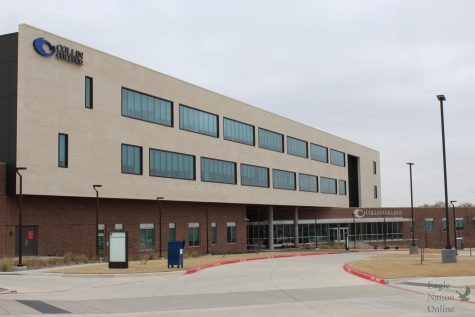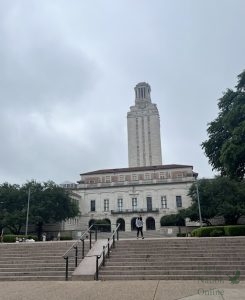Prosper moves to increase from 30 to more than 50 dual credit opportunities
The Collin College logo sits as the windows of the Celina campus building stay partially lit. The campus building finished construction in the fall of 2021. Students currently enrolled in Dual Credit class in either Prosper ISD high school are allowed to use the campus for learning, tutoring and other opportunities for school assistance like the writing center.
May 20, 2022
This article first published in Prosper Highlights Magazine on May 5, 2022.
As students selected the courses for next school year, there was a wider variety of dual credit class options available to them.
Students have the oppportunity to take dual credit classes through Collin College, and, next year, students will also be able to earn more college credit through a new Celina Campus cohort option. Through this program, students will spend half of each school day on the Collin College campus in Celina. Alicia Schulze, the college and career counselor from Collin College for the district, discussed the significance of students being able to earn almost an entire year of college credit.
Dual credit courses allow students to earn credit for both their high school transcript and their college GPA. During the 2022-23 school year, students will be able to earn more than 50 hours of college credit with help from the new Collin College campus in Celina. Superintendent Holly Ferguson said her goal is to provide more opportunities for academic advancement. These concurrent enrollment courses offer students another way to explore their interests.
“The importance of dual credit while in high school provides our students the ability to earn college credit at a very affordable rate,” Ferguson said. “Our students can learn how to begin to navigate college expectations while still living at home with their families and having the support of our school staff. In addition, students who take dual credit courses have more likelihood of earning an additional degree beyond a bachelor’s degree.”
Next year, students can take four dual credit classes throughout the week, and end the year with a total of 26 college credits.
“The new Celina Campus Cohort option for dual credit is a great way for students to earn a ton of college credit while they are still in high school, but it also provides an immersive college experience,” Schulze said. “Students then return to the high school for their afternoon classes. For the first time, students will be able to take a science class for dual credit.”
The Celina Collin College building completed construction last fall. The campus has also been a resource for Dual Credit students to use. Students are currently able to use the writing center, meeting rooms, bookstore and more for their classes. However, with the cohort option students will also have access to on-campus counseling/advising services, the Collin College Library and other amenities unique to the Celina campus.
“The new Celina campus is an important step in the evolving partnership between Prosper ISD and Collin College,” Advanced Academics Director Seth Rutledge said. “The new campus will allow for greater access to Collin College’s offerings than ever before and significant cost savings. The lab facilities at Collin College – Celina will allow Prosper ISD students to enroll in dual credit science courses for the very first time. By utilizing the Celina campus and expanding the courses we offer especially in math and science, students will be able to more efficiently accrue college credits that will count towards their degree requirements.”

In previous years, mainly English and history classes were offered. New math and science courses will be offered to students this fall. Along with the regular core classes, there are multiple Career and Technical Education Courses created for students to earn college credit while working on their high school endorsement. These new Dual Credit courses are just one step in Ferguson’s vision for the future of the district.
“In 2019, a team of students, teachers, parents and community members embarked on writing the PISD Strategic Plan that included innovative learning,” Ferguson said. “This vision was set in place and directed our work as a district to commit to providing an educational environment that fosters growth in teachers and students alike through risk-taking, productive struggle, feedback, observation, collaboration, and communication. Our increase in dual credit offerings has allowed us to put this vision into action while providing a wider range of more rigorous academic opportunities.”
In 2018, the House Bill 1638: Statewide Dual Credit Goals was created in order to address enrollment and acceleration through postsecondary education. The Texas Education Agency has a list of the goals that the bill included: implementing cost benefits for students, assisting students with a successful transition, advising and assuring students receive college readiness, as well as properly analyzing students’ work.
“Making dual credit classes available to students is so important for a number of reasons,” Schulze said. “The idea of college classes can be intimidating; trying out these classes while you are still in high school can help you to build confidence that you can handle the work. Dual credit classes offer students the chance to challenge themselves with college-level work at a significantly lower cost than what they would pay at any four-year school. Additionally, college admissions officers like to see that students have pursued academically rigorous coursework like dual credit.”
Where four-year university students can pay upwards of $750 for a course, dual credit courses are approximately $150. Students are able to gain more control over their future path through the variety of new courses offered. Providing a smoother transition from high school learning to the collegiate level.
“I am taking Dual Credit classes next year because I want a more professional and advanced learning experience,” sophomore Anna Stringer said. “It will simulate what it will be like when I go off and live on my own and attend a university. I also want to challenge myself without feeling overwhelmed and I think that doing Dual Credit will be the perfect balance between more challenging but not too difficult and overly stressful.”
Credit for dual credit classes is awarded based upon successful completion of the course. Dual Credit courses follow Collin College learning objectives as well as the Texas Essential Knowledge and Skills (TEKS) and are taught by Collin faculty. Dual Credit Scholarships are available through the Prosper Education Foundation. Students can find more information and the application on the Counseling Department website.
“Dual credit serves as the next step to integrate college curriculum without college social pressure,” senior Marlee Parrish said. “The professors in my experience have been way more hands-on with the material.”
The expansion of the Dual Credit courses is moving from 30 available credit hours to over 50 available credit hours. With this, students can potentially enter into undergraduate studies with as many as three or more semesters worth of courses completed. These benefits can allow Dual Credit students to maximize their time and credits – not only in high school – but as an undergraduate, as well.
“The most beneficial part about taking Dual Credit, I feel like, is getting to take classes with Collin and being able to get that sort of college experience even though we are still at Prosper,” junior Cooper Smith said. “Just seeing how the professor runs the classroom and prepares you for the collegiate level. I really like the presentations our teacher gives. I feel like it is a lot more relaxed than maybe how AP History would be. I just feel as though it’s more comfortable in a Dual Credit class, since it’s more self-learning and an easier pace.”




























